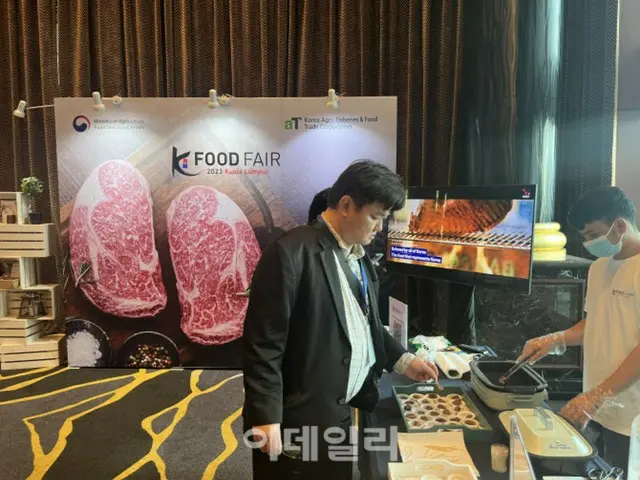Restaurant ``Pull'' in Le Méridien Hotel, located in the center of Kuala Lumpur, Malaysia.
``Rime (PRIME)''. Antoine Rodríguez, Head Chef of Prime, said, ``When I learned that there was other top-quality beef in addition to Japanese and Australian Wagyu beef, I decided to take on the challenge.
"I wanted to try it," he said. ``Prime'' is one of the most prestigious restaurants in the area. Here we have Korean beef aroyo, fillet, and beef shoulder that have been HALAL certified since last month.
They serve meat steaks. There were already quite a few customers who visited this restaurant after seeing the internet viral. On this day, I visited a restaurant to eat Korean beef steak.
Sylvia Lim, a local resident, said, ``I tried Korean beef at an exhibition two weeks ago, and it was so delicious that I came back to eat it at the restaurant.'' fee
"It's completely different from the bulgogi I had at a restaurant," he said with satisfaction. Since Halal-certified Korean beef entered the Malaysian market for the first time in March, a total of 14 tons of Korean beef had been imported by the 21st of last month.
It's being served. Considering that the annual production of Korean beef is 288,000 tons as of 2022, it is still not a large scale, but beef, which is difficult to export due to quarantine requirements, is subject to extremely strict certification.
It is significant that, through the certification, they were the first to break through to the halal market, which accounts for a quarter of the world's population. Ryu Chan-yeol, CEO of Handaun FSL, the only Halal-certified slaughterhouse in the country, said:
``If Korean beef becomes more well-known and popular in Malaysia, we will see a full-fledged expansion of Korean beef into the world.'' Most of the Korean beef currently exported is sold at local high-end restaurants and Korean restaurants.
It is available at physical stores, etc. This is to solidify the position of Korean beef through premium marketing. And part of it will start this month in Putalinja, a high-class residential area in Kuala Lumpur.
K Plus Food Market is a premium supermarket located in Petaling Jaya.
Market). This large 850 tsubo supermarket sells local ingredients as well as Korean fruits, vegetables, and processed foods.
items are on sale. In the meat corner of the market, high-quality packaged Korean beef was displayed along with Australian Angus beef, which is known locally as a high-quality ingredient.
. The Halal certification certificate is also displayed next to it. The price is 52.49 ringgit (approximately 1,660 yen) for 100 grams of first-grade loin meat, and the price is 52.49 ringgit (about 1,660 yen) for 100 grams of first-grade loin meat.
It is about 1.7 times more expensive than pork loin. Despite this, local consumers are very interested in Korean beef. Lee Shen, a man in his 30s who bought Korean beef, said, ``I wanted to buy Korean beef on a special day on a Korean TV series.
"I often saw them grilling and eating it," he said, adding, "I'm happy that Korean beef, which I've been curious about, has been certified as halal and can now be eaten."
In addition to Korean beef, various other Korean foods are entering the halal market. Korean TV series, movies, music, etc.
The curiosity about Korea that was born through this experience has led to its food culture. In particular, Korean ramen is so popular that you can find it in any local supermarket. Korea Agriculture, Fisheries and Food Distribution Corporation (aT
) An official from the Kuala Lumpur branch said, ``Korean ramen goes well with Malaysians who like spicy and exciting flavors,'' adding, ``Hangang ramen, which often appears in K content.''
' has recently become popular at convenience stores,'' he said, conveying the local atmosphere. From the 13th of this month, Sunway Pyramid (Sunway
I could feel the enthusiasm for Korean products at the ``K Food Fair'' held at the Pyramid shopping mall.
. ``K Food Fair'' will feature a tasting corner where Korean dishes such as bibimbap, pu LUDA kbok kung myeon, and Korean beef will be made and distributed on the spot, as well as agricultural products, ramen, seaweed, sweets, and other products that will be introduced and sold.
It is a place where you can try on Hanbok, try on traditional Hanbok, and play traditional games. During the three days the event was held, Malaysians showed great interest in Korean food. Go around the event venue and collect
Long lines formed to sample and purchase the Korean foods they tasted on the spot. Linnie Avila, a woman in her 60s who came to the venue to sample bibimbap, said,
``I became interested in Korean culture after watching ``Sonata,'' but then I also became interested in food culture after watching ``The Vow of the Court Lady,'' which was very popular in Malaysia.'' tree
Things like whip and gochujang are very palatable.'' On the 11th, Sunway Resort Hotel
An export business meeting was also held at the hotel, attended by 30 Korean exporters and 56 local buyers. A total of 237 items,
Business negotiations valued at 20 million dollars (approximately 3 billion yen) were held, of which 22 resulted in business alliances and contracts valued at 2.3 million dollars (approximately 340 million yen). Apples, pears, persimmons, etc.
In addition to these agricultural products, products such as omija (schisandra) drinks, soy milk, and konnyaku jelly were also popular. Lee Mateo, CEO of KMT Group, the largest Korean food distribution company in Malaysia, said, ``20
When the World Cup was held in 2002, Korean food exports increased significantly, and the recent Korean wave boom has created a similar atmosphere."
"The distribution of Korean food products in Korean markets has only just begun," he said.
2023/10/17 07:08 KST
Copyrights(C) Edaily wowkorea.jp 107

